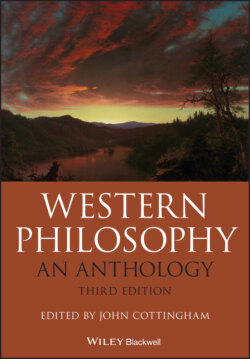Читать книгу Western Philosophy - Группа авторов - Страница 120
Notes
Оглавление* Immanuel Kant, Prolegomena [1783], excerpts from §§ 1, 5, 11, 12, 18, 29, 30, 32, 33 and ‘Solution of the General Problem of the Prolegomena’. English version trans. E. Belfort, in Kant’s Prolegomena (London: Bell, 1891), pp. 12–15, 22–3, 30–1, 44, 59–60, 60–1, 62–3, 115–16; with minor modifications.
1 1 Critique of Pure Reason, A5; B8.
2 2 ‘Coal burns’, or ‘bread nourishes’, are synthetic propositions, since their truth cannot be established merely by analysing the meaning of the subject terms (‘coal’, ‘bread’). Contrast this with ultimately uninformative tautological or analytic propositions, such as ‘bachelors are unmarried’, where the predicate (unmarried) is contained within the subject (contained within the concept of bachelorhood). Kant’s position should be compared with that of Hume, who argues that no genuinely informative propositions can be known a priori (see introduction to extract 7, above).
3 3 His argument here seems questionable, since the relevant proposition is clearly analytic if we define ‘analytic’ (as Kant himself sometimes does) as that which cannot be denied without contradiction.
4 4 This argument is developed in the Critique of Pure Reason; see below, Part VII, extract 7.
5 5 ‘Aesthetic’ (from the Greek word for sensory awareness) is the term used by Kant in the Critique of Pure Reason to refer to the temporal and spatial intuitions in terms of which we experience the world.
